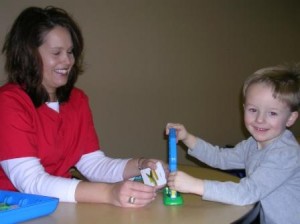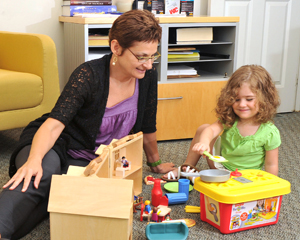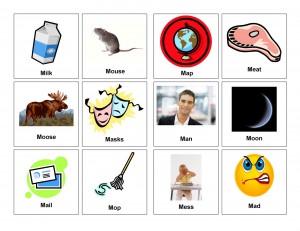This week, we’re featuring Gina Badalaty of Mom-Blog. Gina has been blogging about special needs since 2002. Her focus is on raising awareness and helping other parents of special needs kids. Gina herself has two special needs children: Amelia has a rare form of Down syndrome and Zoe has autism spectrum disorder (ASD). In our interview, Gina discusses the many speech therapy techniques she has used with both of her daughters – the ones that worked and the ones that didn’t. While not all speech therapy treatments helped Zoe and Amelia, it’s important to remember that every child is unique. Gina also pointed out that treatment techniques are always evolving. The number one lesson from Gina’s story is to keep trying until you find something that helps, and to never let your child’s disability get in the way of her happiness.
More Great Articulation Apps
Speech Therapy TechniquesAs your child grows, he will likely learn to speak in complete sentences, control the tone of his voice, and articulate words clearly. If you suspect your child is struggling with proper articulation or he has a speech delay or disorder, bring him to a speech-language pathologist (SLP) for an evaluation. A speech therapist can help your child with an array of communication issues, including articulation. You can also use speech therapy activities at home to encourage his progress, including using apps that were designed specifically to teach articulation.
How to Teach the “R” Sound
Speech Therapy TechniquesThe “R” Sound
The “r” sound can be especially challenging to pronounce. It’s a voiced sound, produced by the vibration of the vocal cords. The reason why this particular sound is so difficult to master is that it can be correctly pronounced 8 different ways, depending on the letters with which it is combined. If you factor in the positioning of all of the variations of an “r” at the beginning, middle, or end of a word, you end up with 21 total variations.
Top Toys for Speech Therapy
Speech Therapy TechniquesWhile speech therapy is definitely going digital, you can still reap the benefits of using timeless toys like dolls and games to elicit communication and encourage proper sentence structure. Many speech-language pathologists (SLPs) customize their use of toys to the child’s individual interests. For example, an SLP might use a Grover doll for a child who loves “Sesame Street” or a Disney character for a child who loves “Aladdin.” Keeping the child engaged in learning is crucial to encourage progress.
How to Teach the “M” Sound
Speech Therapy TechniquesBabies often begin their initial explorations with sounds with the “M” sound. If your baby’s first word was “mama,” he’s not alone. Most children have command over this sound by the time they are two or three, if not earlier. If you think that your child might be displaying difficulties with the “M” sound, consult a speech-language pathologist (SLP) sooner rather than later. Although your child may not yet be old enough to go to school, you can still take advantage of free speech therapy with the Early Intervention program.





